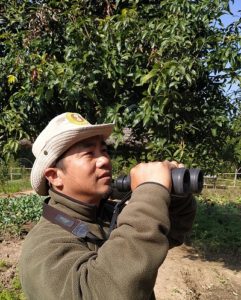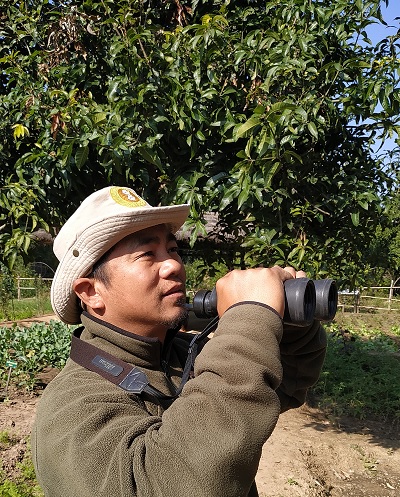A peak into the life and loves of a naturalist in Bandhavgarh Tiger reserve with Raju Gurung at Pugdundee Safaris

Experience and Background:
Raju hails from Nepal and belongs to a well known family of naturalists and birders, all with an observational eye. He worked for nearly 15 years with Tiger Tops in Nepal, before joining Pugdundee Safaris in central India five years ago.
What do you think is the role the naturalists play in a creating a tourism experience?
Naturalists play a pivotal role in the jungle lodges. They are the immediate point of contact for the guests. They help educate the guests with information on wildlife, while ensuring their stay in the lodges is comfortable and exciting.
They are instrumental in inculcating a sense of wonder and interest even amongst the not-so-interested guests, towards flora and fauna. They not just double up as guides but also ensure that the guests have a seamless stay at the lodges, and are extended the best of hospitality.
The naturalists as a community also strive to contribute towards environmental awareness, sustainability and conservation. They work in tandem with the village schools, educating the children the importance of conservation, and sensitising them towards the green ecosystem in which they live.
Any memorable experience to relate with customer?
I had an incredible experience which is very close to my heart and that helped me embark on an onward journey of getting to know the forests even better, than I already did.
With the onset of the winter season, a couple travelled to our lodge and booked themselves into a few safaris. They were mostly very keen to see only tigers.
But unfortunately, they didn’t get lucky and were extremely disappointed. My duty as a naturalist is to ensure our guests remain happy. So, I started narrating stories from the forests in different forms. I spoke about the chirping sounds of different birds, their varied species, the freshly blooming, fragrant Mahua trees, the morning ray of wispy golden light, tuning in to the alarm calls of cheetals (Spotted Deer) that signalled a predator could be lurking around, etc.
The guests got highly engrossed in this conversation. They learnt many new things about the forests which they were unaware of, thereby losing themselves to the lap of nature. They were intrigued by the mysteries and stories of the forests, appreciating the true value of a forest. One which translated beyond just tiger sightings. I was thrilled to see them visit us in the next season just to experience the forests, and not for a tiger centric visit.
Any uniqueness of the park?
Bandhavgarh was Maharaja’s (then King’s) hunting ground, before it became a conservation reserve. Nowhere else in the world, I believe the tigers have survived the way they have here. Great protection efforts have ensured one of the highest density of the tigers in this park. In my view Bandhavgarh is one of the best places to see wild tigers.
What is the future you see of Naturalists in India?
With urbanisation and metropolises sprouting across the country, we are have begun to value nature a little more. More and more people do visit wildlife sanctuaries to become one with nature. Everyone wants to unwind from the busyness of city life and connect with nature.
The future will only show growth in this trend. This also is leading to a rise in eco-tourism and wildlife tourism.
Hence, naturalists have a key role to play in helping people interpret and understand nature better. And also develop a connection with nature.
Good, knowledgeable, and enterprising naturalists are therefore much in demand. People are able to value the importance of able guides or naturalists who will ensure they have a wholesome forest experience. Job opportunities for naturalists are on the rise.
It is also a very satisfying career, where you can become one with nature, while expanding and sharing your knowledge bank.
A devoted naturalist can help turn an ordinary guest into a wildlife lover, and an ambassador for wildlife and conservation.






